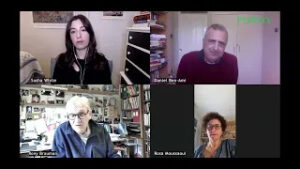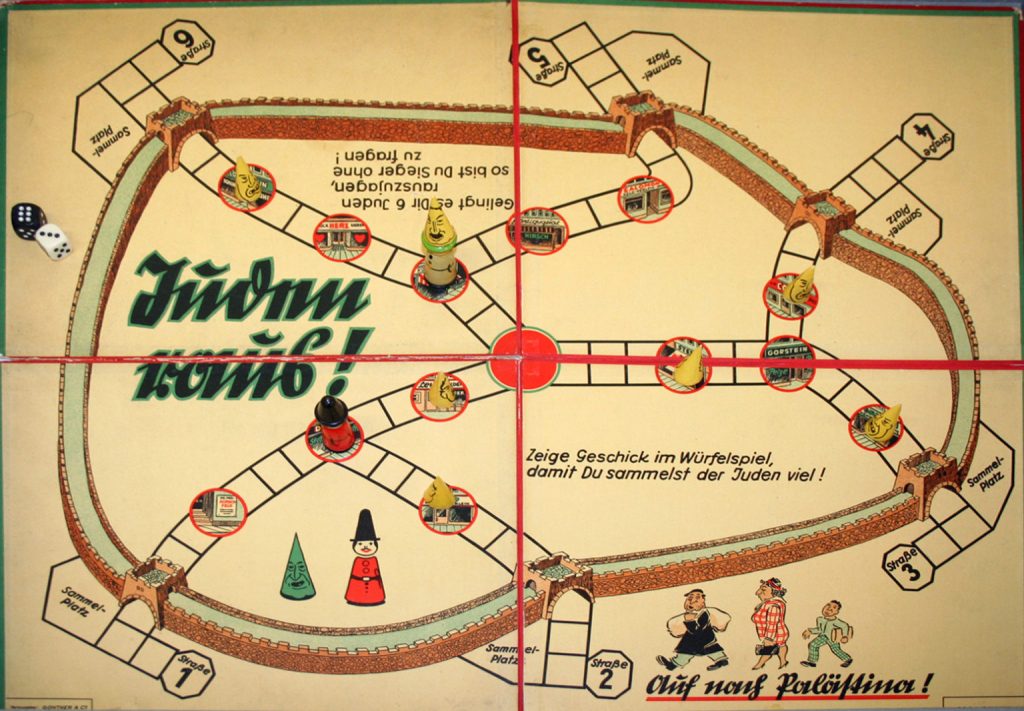
Juden Raus (Jews Out!) board game from the 1930s – Wiener Holocaust Library
Update November 8, 2021: This article has a response: On anti-Zionism and Antisemitism: A Response to Mark White’s Article in Plebity
As a Jew with a strong, although nontraditional sense of Jewish identity, I hold both what have historically been considered leftist beliefs and a critical view of Israel. I’m tired of hearing over and over that to be an ‘authentic’ Jew, I must adhere to a certain ideology in regards to Israel. In the same way that some people of color object to being told how they must think by the warriors of the woke social justice movement, I grow increasingly impatient with those who mandate the acceptable beliefs for a Jew with respect to Israel and Zionism.
Many Jews in North America, Europe and elsewhere in the world regularly invoke loyalty to Israel as a defining condition of Jewish identity. These same people typically conflate even mild criticism of Israel with antisemitism. They seem unwilling or unable to distinguish between those who have legitimate criticisms of Israel and actual antisemites. In this article entitled Yes, Anti-Zionism Is Anti-Semitic. But It’s Still Protected Speech, Pamela Paresky and Samantha Harris voice this claim while also, more unusually and to their credit, calling it protected speech that should be allowed under the First Amendment. But their premise is still wrong. Anti-Zionism is not automatically synonymous with antisemitism.
Genuine antisemites profit from this viewpoint
Demands that Jews express loyalty to Israel amplify one of the most basic antisemitic tropes: namely that Jews always have a divided loyalty and present a sometimes hidden but always present, united front against non-Jews. The idea that ‘all Jews’ must think a certain way is a point of view shared by Zionists and antisemites alike.
The idea that ‘all Jews’ must think a certain way is a point of view shared by Zionists and antisemites alike.
When Jews discourage debate about Israel and Jewish identity, they prevent open conversation and legitimate criticism of Israel, which leaves the field open for real antisemites to use anti-Zionist language to promote and spread their actual antisemitism.
In much the same way that the most avid proponents of woke identity politics label any disagreement as ‘fascism,’ the ‘anti-Zionism equals antisemitism’ crowd make it more difficult to recognize the real thing when it appears. Like the boy who cried wolf, they shout non-stop alarms of antisemitism when it isn’t really there, and then when it shows its genuine face, their cries of alarm have already been rendered meaningless and are ignored.
This does not mean that the rise of actual antisemitism in recent times is not real and alarming. This trend is being documented by Pamela Paresky and others, for example here and here. This is useful and valuable work.
In Europe the rise of antisemitism is unfortunately significant.
In a recent article in Le Monde a poll revealed the disturbing reality of European-wide attitudes toward Jews:
“21% of Europeans who were asked ‘agree’ (7%) or ‘somewhat agree’ (14%) with the idea that secret networks of Jews influence the economic and political life of the world. Greeks (58%) and Hungarians (39%) are particularly convinced of this.”
Unfortunately, the problem is only made worse when the clearest, most open expressions of antisemitism are pushed underground, and it becomes difficult or impossible to see people’s true beliefs.
And why should it be out of bounds to question a basic tenet of many Zionists that the existence of Israel somehow makes Jews around the world safer?
We know that suppression of speech does not work as intended. It does not prevent the spread of ideas. We know this because we can see that global antisemitism is sharply rising, even in countries such as France and Germany where antisemitic speech is illegal.
Openly expressed antisemitism typically comes from the far right. It thrives on people’s genuine problems and offers up time-worn explanations of Jewish control—of the media, of the politicians, of everything that is oppressing them in their lives. This form of antisemitism can at least be confronted and refuted head on.
However, a more pernicious form of antisemitism has been gaining ground increasingly among the liberal left. Here widespread disagreement with Israeli policy has created an atmosphere where sharp criticisms of Israel and Zionism have become commonplace.
It would be naive to think that by simply encouraging free expression you can somehow prevent antisemites from cloaking their hatred of Jews in anti-Zionist language. Rather, when people express their actual thoughts, we are able to refute them clearly as well. But it happens that people also mix their message without realizing what they are doing. This sometimes genuine confusion can only be addressed by countering that speech with honest explanations as to how it blurs the lines between criticisms of Israel and hatred of Jewish people. This is the only way that stands a chance of teaching people how to recognize the distinction between anti-Israel criticism and anti-Jewish tropes. But if your message right from the beginning is that the two are both described by the same word – antisemitism, you have essentially surrendered the battle by dropping your most effective weapon. That is the failure of the ‘anti-Zionism is antisemitism’ argument.
We can see this clearly by taking a brief dip into the murky swamp of antisemitic memes commonly seen all over the internet. Let’s think for just a moment about how the blurred line between Israel criticism and the worst of antisemitic tropes is weaponized in this reference to the Rothschilds in the image below.

Do those who categorically claim that ‘anti-Zionism is antisemitism’ really mean to debase language to the point that they cannot distinguish between that image above and this one below?
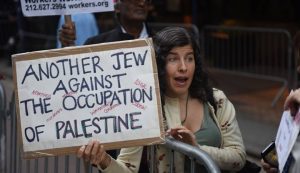
It is true that many people lack the historical context and really cannot make that distinction. That Rothschild image is extreme and lacks any subtlety. There are many others along the same lines that are far more subtle. I know from personal experience that at least some people can see this when it is explained and can learn to develop a critical filter. But you can’t explain the difference if you have already said that these images are one and the same thing: ‘antisemitism’.
The new Twitter-like social media platform Gab recently did us all a favor by showing its true colors on Twitter… see the tweets below from their then official account.
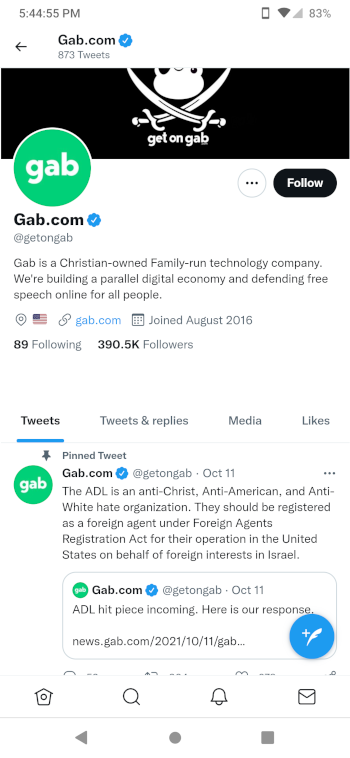
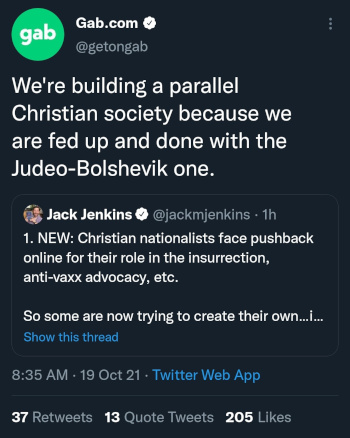
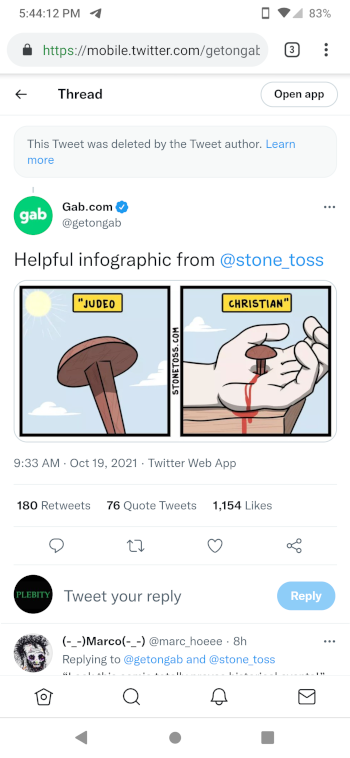
And by the way, that last one may seem crystal clear to most people, but nonetheless it still does not leap out to everyone as ‘the Jews killed Jesus’. In any case, Gab was removed from Twitter, but anti-free speech warriors should realize that this is a pyrrhic victory. By forcing this kind of clear expression of antisemitism underground, they create a new playing field where antisemites resort to coded use of anti-Zionist or anti-Israel language when what they really mean are ‘Jews,’ period. The debate is muddied; it becomes more difficult to evaluate people’s positions and to gauge the sincerity of their arguments.
As a Jewish teenager living for a year in Israel in the late 60s, I was able to give up my own myth that Jews, having been victims of prejudice since time immemorial, could not themselves be racists and oppressors.
Gab did us a favor and told us clearly who they are. They are gone from Twitter now, but how many people will still join Gab unwittingly, simply seeing it as a free-speech platform and honest alternative to Silicon Valley social media?
As presumed progeny of the Enlightenment, we should all feel a duty to try our best to approach the world rationally and make an honest effort to let go of our myths, even the ones we cherish the most. As a Jewish teenager living for a year in Israel in the late 60s, I was able to give up my own myth that Jews, having been victims of prejudice since time immemorial, could not themselves be racists and oppressors.
The casual racism that I observed of Israelis towards the Arab population was blatant, pervasive and for an outsider, shocking. Casual slurs aimed by Israelis at Arabs in their everyday conversations were widespread, and it was so common that it was clear that the people around me didn’t even notice. Palestinians in the newly occupied territories were simply understood to be second class citizens. Well, to be accurate, they were second class residents, not even citizens.
Like the trans ideologues, the ‘Zionists’ also refuse to engage with even the mildest challenges to their doctrine, and simply reject any critique as ‘antisemitism’.
Even back then it was clear that the demographic reality of the huge and growing Arab population put Israel on a collision course with its self image as a democracy. With a disenfranchised and ever-expanding minority non-Jewish population, Israel could be a Jewish state but could not also claim to be a true democracy. This reality of an excluded, second-class population leads to a legitimate claim that Israel is an apartheid state. There is no logical way to reconcile the claim that Israel must remain Jewish while at the same time lauding it as the only true democracy in the region.
This is, however, the untouchable third rail of modern discourse, even among those who are proponents of free speech in other areas. Like the wokest of transgender activitists who allow no debate, this tweet exemplifies the attitude that there is nothing to discuss, anti-Zionism is antisemitism: “Yes, it is really that simple.”
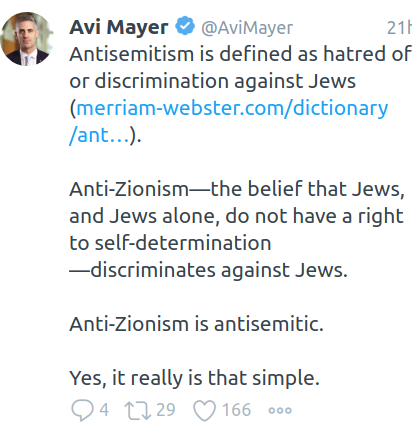
It is astounding how any criticism of Zionism or Israel triggers very much the same reaction that gender critical opinions trigger with woke trans gender ideologues. Like the trans ideologues, the ‘Zionists’ also refuse to engage with even the mildest challenges to their doctrine, and simply reject any critique as ‘antisemitism’.
But legitimate critiques don’t just go away by falsely conflating them with something else that is abhorrent. It remains legitimate to critique Israel, its nationalist government and its politics, to point out the profound imbalance of power between the State of Israel, its military, and the Palestinians, and to point out that Israel has consistently acted in bad faith in its policies in the occupied territories.
And why should it be out of bounds to question a basic tenet of many Zionists that the existence of Israel somehow makes Jews around the world safer? Perhaps this point of view was indisputable in 1948. Europe was truly that metaphorical burning building for Jews through much of the 19th century. With the widespread pogroms of the late 1800s and eventually the slaughter of the Holocaust, Europe was literally unlivable for Jews, and they were not welcome anywhere else. The survivors of the Holocaust had no choice but to jump from that burning building to save themselves. But we should also acknowledge that the idea that they didn’t land on people who were already there is a myth. It should be possible to recognize the wrong that was done to those people—the Palestinans, even while acknowledging it as a tragically unavoidable act.
The idea of a Jewish State was a rational aspiration and source of hope for the remaining Jews of Europe. For many of them, my own grandmother included, who had known first-hand the violence perpetrated by the police in their home countries, it was a powerful emotional experience to arrive in a land where the authorities and even the police were Jewish. This represented to them a place of safety where Jews would belong and at last overcome the age-old precarity that characterized their lives in Europe. It was a myth, but an easy one to believe; that there could be a land without a people that could serve the survival needs of a people without a land.
At that moment in history it was possible, perhaps even necessary, for a person of Jewish identity to accept that myth. But that reality has changed, and the idea that Israel makes us all safer is at best an arguable concept and is considered by many to be completely disproved and even discredited. Even the founding concept of that state presents an impossible contradiction: that it is and must remain a Jewish State and can at the same time claim to be a democracy.
“To all the Jews of France, all the Jews of Europe, I would like to say that Israel is not just the place in whose direction you pray, the state of Israel is your home,” – Benjamin Netanyahu
Similarly, brushing aside arguments that are critical of Israel from non-Jews such as Palestinians, Iranians or others in the Muslim world, makes it easy to ignore the possibility that their enmity may be fueled more by Israel and its policies than by some sort of historical, ‘racial’ or ethnic animus which we call antisemitism. Making this fundamental mistake plays right into the hands of the Israeli right and Israeli nationalists.
Following the 2015 massacres at Charlie Hebdo and the kosher grocery in Paris, Netenyahu came to France in a supposed show of solidarity with the victims. He cynically joined the ‘I am Charlie’ march through Paris and used the opportunity to encourage the fears of French Jews—urging them to come to Israel, repeating the myth that this was the only place Jews around the world could be safe. In this way Netanyahu confirmed one of the dearest of antisemitic tropes; that Jews have a special allegiance to Israel that in the end will always show itself to be more important than loyalty to their country of birth.
It is even a legitimate argument to say that Israel and its right wing nationalist policies are the number one cause of the current rise in global antisemitism.
Relentlessly conflating anti-Zionism with antisemitism, and attempting to suppress speech critical of Israel enables real antisemitism. It reinforces the impression that Jews are a bloc, and that their identity is inseparable from Israel. This makes it difficult to identify real antisemitism and allows antisemites to use coded language substituting the word Zionist when the word they really want to say is ‘Jew.’ This has a terrible effect because it pushes people to develop veiled methods of expressing their beliefs; you will never know who is your friend and who is your enemy.
Our best and only hope to break the seemingly never-ending pattern of antisemitism is to allow for genuinely open debate and to be consistent in support of free speech. It would be so much more useful if actual bigots could openly say what they were really thinking so we would know who they are. We could honestly debate amongst ourselves and with others the value of some of our most dearly held beliefs. We could stop conflating antisemites with legitimate critics who challenge myths we might all be better off leaving behind.
Israel has existed since 1948. Zionism as a political movement has existed since the 19th century. Jews as a distinct group have been around for thousands of years. We are doing the work of antisemites by including calls for allegiance to Israel in virtually every discussion and article about antisemitism. We need to stop.?
https://www.jta.org/2021/09/03/opinion/if-you-are-going-to-spell-it-antisemitism-then-you-should-remove-the-hyphen-from-anti-zionism (Couldn’t disagree more:))
https://www.tabletmag.com/sections/arts-letters/articles/dreyfus-zionism-sartre
Ainsi, 21 % des Européens interrogés sont « d’accord » (7 %) ou « plutôt d’accord » (14 %) avec l’idée que des réseaux secrets tenus par les juifs influenceraient la vie économique et politique du monde. Les Grecs (58 %) et les Hongrois (39 %) en sont même particulièrement convaincus.
21% of Europeans who were asked ‘agree’ (7%) or ‘somewhat agree’ (14%) with the idea that secret networks of Jews influence the economic and political life of the world. Greeks (58%) and Hungarians (39%) are particularly convinced of this.
Yes, Anti-Zionism Is Anti-Semitic. But It’s Still Protected Speech. https://forward.com/opinion/430307/yes-anti-zionism-is-anti-semitic-but-its-still-protected-speech/
Notes:
Juden Raus Boardgame
https://wienerholocaustlibrary.org/object/obj046/
“Using crude antisemitic stereotypes and imagery, the game’s themes reflect racial hatred, forced deportations, and confiscation of Jewish property. The board shows a walled town, through which players move to round up Jews and deposit them outside the city walls, where a slogan reads “Auf nach Palästina!” (English: “Off to Palestine!”) The winner is the first to remove six people.”
The IHRA Working Definition of Antisemitism
https://www.ohchr.org/Documents/Issues/Religion/Submissions/JBI-Annex1.pdf
The definition:
Antisemitism is a certain perception of Jews, which may be expressed as hatred toward Jews. Rhetorical and physical manifestations of antisemitism are directed toward Jewish or non-Jewish individuals and/or their property, toward Jewish community institutions and religious facilities.
The examples:
Manifestations might include the targeting of the state of Israel, conceived as a Jewish collectivity. However, criticism of Israel similar to that levelled against any other country cannot be regarded as antisemitic.
Antisemitism frequently charges Jews with conspiring to harm humanity, and it is often used to blame Jews for “why things go wrong.” It is expressed in speech, writing, visual forms and action, and employs sinister stereotypes and negative character traits.
Contemporary examples of antisemitism in public life, the media, schools, the workplace, and in the religious sphere could, taking into account the overall context, include, but are not limited to:
Calling for, aiding, or justifying the killing or harming of Jews in the name of a radical ideology or an extremist view of religion;
Making mendacious, dehumanising, demonising, or stereotypical allegations about Jews as such or the power of Jews as a collective — such as, especially but not exclusively, the myth about a world Jewish conspiracy or of Jews controlling the media, economy, government or other societal institutions;
Accusing Jews as a people of being responsible for real or imagined wrongdoing committed by a single Jewish person or group, or even for acts committed by non-Jews;
Denying the fact, scope, mechanisms (e.g. gas chambers) or intentionality of the genocide of the Jewish people at the hands of National Socialist Germany and its supporters and accomplices during World War II (the Holocaust);
Accusing the Jews as a people, or Israel as a state, of inventing or exaggerating the Holocaust;
Accusing Jewish citizens of being more loyal to Israel, or to the alleged priorities of Jews worldwide, than to the interests of their own nations;
Denying the Jewish people their right to self-determination, e.g., by claiming that the existence of a State of Israel is a racist endeavor;
Applying double standards by requiring of it a behaviour not expected or demanded of any other democratic nation;
Using the symbols and images associated with classic antisemitism (e.g., claims of Jews killing Jesus or blood libel) to characterise Israel or Israelis;
Drawing comparisons of contemporary Israeli policy to that of the Nazis;
Holding Jews collectively responsible for actions of the state of Israel.
Antisemitic acts are criminal when they are so defined by law (for example, denial of the Holocaust or distribution of antisemitic materials in some countries).



